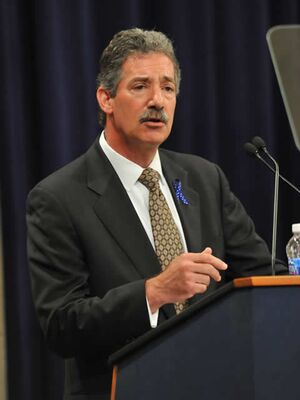James M. Cole
(lawyer) | ||||||||||||
|---|---|---|---|---|---|---|---|---|---|---|---|---|
 | ||||||||||||
| Born | May 2, 1952 Evanston, Illinois, U.S. | |||||||||||
| Alma mater | University of Colorado Denver, University of California (Hastings) | |||||||||||
| Party | Democratic | |||||||||||
US Deputy Attorney General 2010-2015 under Barack Obama. Protected opioid producers.
| ||||||||||||
James Michael Cole[1] is an American attorney who was United States Deputy Attorney General from December 29, 2010 to January 8, 2015. He was first installed as Deputy Attorney General following a recess appointment by President Barack Obama on December 29, 2010,[2] and confirmed by the Senate on June 28, 2011.
Background
Cole earned a B.A. degree in 1975 from the University of Colorado Denver and a J.D. degree from the University of California, Hastings College of the Law in 1979.[3]
Professional career
Cole worked in the United States Department of Justice for 13 years, from 1979 until 1992, when he entered private practice.[4] During his time in the DOJ's Public Integrity Section, Cole successfully prosecuted two federal judges on corruption charges, including Judge Robert Frederick Collins in 1991.[1] Even after leaving the DOJ, Cole remained involved in matters related to the federal government, serving in 1996 and 1997 as the special counsel to the United States House Committee on Standards of Official Conduct (known as the House Ethics Committee) during the investigation of Newt Gingrich on ethics violations.[1]
Cole was a partner at the law firm Bryan Cave LLP from 1995 until December 2010.
Deputy Attorney General
The Cole Memorandum was a United States Department of Justice memorandum issued August 29, 2013 by Cole during the presidency of Barack Obama. The memorandum, sent to all United States Attorneys, governed federal prosecution of offenses related to marijuana. The memo stated that given its limited resources, the Justice Department would not enforce federal marijuana prohibition in states that "legalized marijuana in some form and ... implemented strong and effective regulatory and enforcement systems to control the cultivation, distribution, sale, and possession of marijuana," except where a lack of federal enforcement would undermine federal priorities (such as preventing violence in marijuana cultivation and distribution, preventing cannabis impaired driving, and preventing marijuana revenues from going to gangs and cartels).[5][6]
In February 2012, Joseph Rannazzisi, chief of the Drug Enforcement Administration's Office of Diversion Control, issued immediate suspension orders against the corporation Cardinal Health's supply of oxycodone to suspected pill mills.[7] Deputy Attorney General Cole then called Rannazzisi to a meeting at Justice Department headquarters where Cole warned him "it made good sense to listen to what Cardinal had to say". Rannazzisi was fired from the drug diversion office in August 2015.[7] Cardinal was never fined.
Later career
After serving as Deputy Attorney General, Cole moved to Sidley Austin, where he was made partner.[7]
References
- ↑ a b c http://partners.nytimes.com/library/politics/0118gingrich-cole.html
- ↑ http://www.politico.com/blogs/laurarozen/1210/White_House_expected_to_announce_recess_appointments.html
- ↑ http://www.bryancave.com/jmcole/
- ↑ http://www.politico.com/politico44/perm/0510/obama_taps_cole_for_deputy_a_g_29bf7c52-b7d7-43b9-85d7-14b9e97bc7f8.html
- ↑ Memorandum for All United States Attorneys: Guidance Regarding Federal Marijuana Enforcement, Office of the Deputy Attorney General (August 29, 2013).
- ↑ Ashley Southall & Jack Healy, U.S. Won’t Sue to Reverse States' Legalization of Marijuana, New York Times (August 29, 2013).
- ↑ a b c https://www.washingtonpost.com/investigations/the-dea-slowed-enforcement-while-the-opioid-epidemic-grew-out-of-control/2016/10/22/aea2bf8e-7f71-11e6-8d13-d7c704ef9fd9_story.html
Wikipedia is not affiliated with Wikispooks. Original page source here